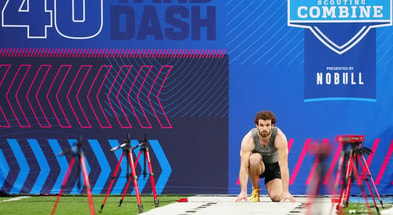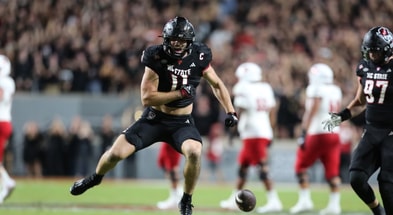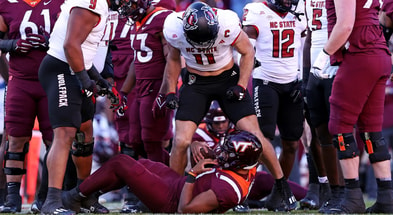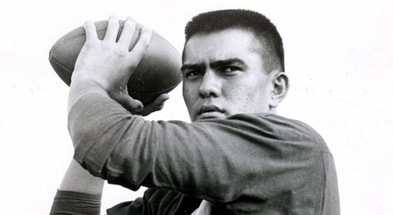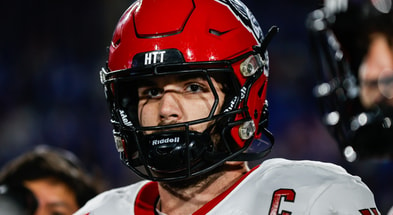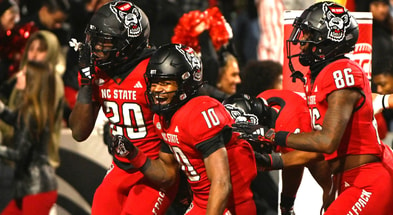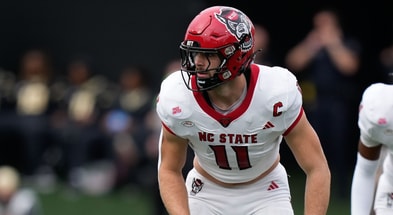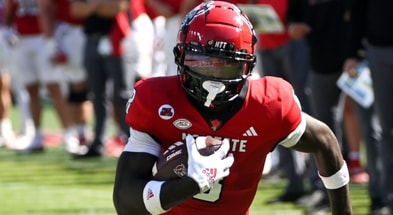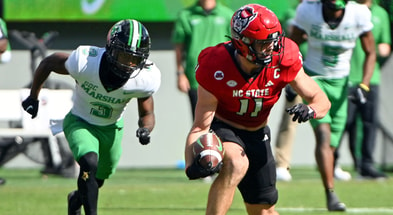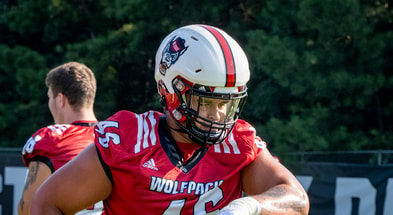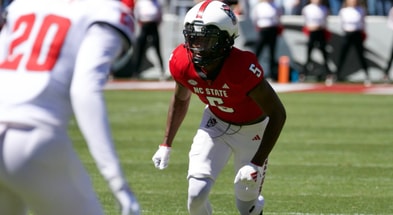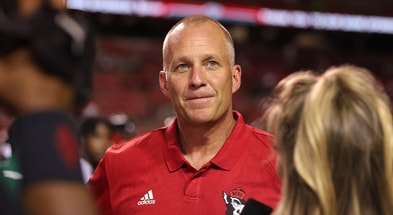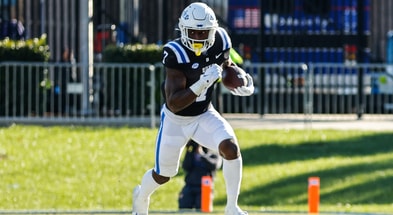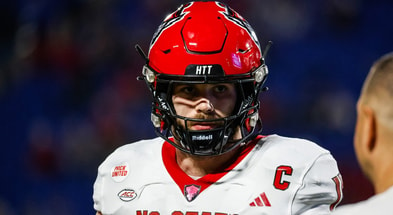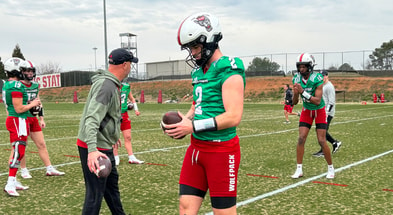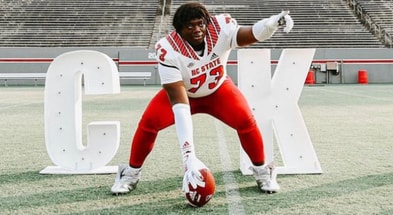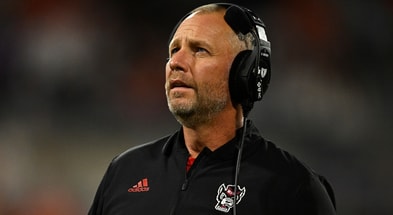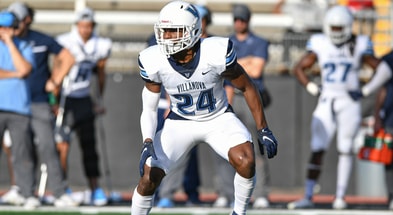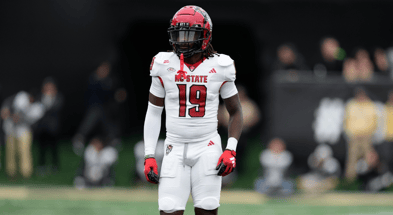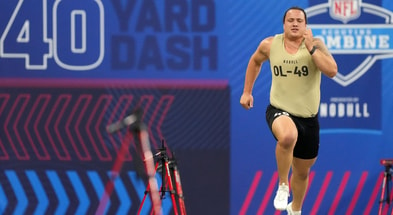Rosie Amato, more quietly than brother Chuck, left his mark in ACC football
The brothers were teammates, both under their parents’ roof and in the locker rooms where they prepared for their respective sports.
One idolized the other and followed in his footsteps from Easton, Pennsylvania, to Raleigh, North Carolina, where they found new families and new professions that seemed, at best, at odds with each other.
The referee and coach were not exactly enemies, but their statements of mutual respect and admiration sometimes butted heads in the throes of competition in the few times they were ever there together.
Like this one time: The referee was confident he had seen a perfectly legal move and didn’t make a call. On the sidelines, the coach went apoplectic, just as sure that the move was more illegal than driving on the wrong side of the road.
They argued at the scorer’s table.
“I’ll take your points off the board,” the referee warned.
“Take them all off,” said the coach, “and we’ll still win this thing.”
They argued all the way home, the referee driving his brand new Ford Mustang that afternoon in 1970 and the coach yapping in the back seat until the referee fulfilled every parent’s threat: He pulled the car over so they could settle the argument.
They didn’t speak to each other for weeks, avoiding each other like coaches and officials probably should.
Rosie and Chuck Amato were at a heated impasse — all over a junior high school wrestling match.
Eventually, they worked things out, but you can just imagine how it played out: hotheaded Italians, both 100 percent sure they were in the right, holding a grudge for weeks. The Feuding brothers — one still living with their parents in his first coaching job out of college — trying to find a way to avoid each other over Sunday gravy in a close-knit household.
What a scene.
Oh, they laugh about it now. At the time, however, the anger was real and the silence was expected to be permanent.
“He was being hard-headed,” Rosario Amato said from his home in Bethlehem, Pennsylvania.
“What happened was we had a really good high school team, with a bunch of junior high kids who eventually became college wrestlers,” Chuck replied from his home in Raleigh.
“I asked our athletics director, Bob Maitland, if he could find us a tournament we could take them to, and he found one in New Jersey, about an hour away.
“We had won every one of the weight classes until the last one, and that’s what started all the yelling.”
The next year, Chuck wanted to take his junior high squad back to New Jersey to defend his team championship. When he asked his athletics director to enter the team again, Maitland said no.
“After what you and your brother pulled last year,” Maitland said, “they decided to only allow teams from New Jersey to enter the tournament this year.”
Only the Amato brothers could get kicked out of Jersey.
Both Rosie and Chuck, like every other Keystone State native, wanted to play football, and possibly wrestle, at Penn State. In the end, however, Rosie Amato decided to travel south from their native Easton, following in the footsteps of high school teammate Bob Renner, to play for Penn State graduates, NC State football head coach Earle Edwards and his defensive coordinator Al Michaels. It began an 18-year run of the Wolfpack having at least one former Easton player on its roster.
Rosie was immediately homesick, having never lived away from home, and was ready to go back almost as soon as he got to NC State.
“I called my dad and was all set to tell him I was coming home,” he explained. “Before I could tell him, he said that my grandmother, who we called Nonnie, wanted to know how I was doing in college.
“To me, that was him telling me that there were a lot of people back at home who were watching what I was doing and pulling for me to be successful. He never really said it, but I got the message. I stuck it out, and a whole lot of good things happened.”
A defensive tackle, Amato sat out the 1961 season, saw some action as a reserve in 1962 and became a starter in 1963 and 1964, while the Wolfpack began a string of three consecutive Atlantic Coast Conference championships (1963-65).

He played in two landmark games, the 1963 regular-season finale against Wake Forest, a Friday night contest at Riddick Stadium on the same day President John F. Kennedy was shot, and in the 1963 Liberty Bowl against Mississippi State, in the last time that postseason game was played in Philadelphia before moving to Memphis.
It was at that game that Rosie introduced his younger brother Chuck to Edwards, who wasn’t exactly impressed with his future linebacker. Chuck’s normal playing weight in football was about 200 pounds, but he had scaled back to 167 to wrestle in the Pennsylvania state championships.
“I feel like I did pave the way for him,” Rosie said.
Chuck, however, didn’t want to follow that road. He was solidly intent on going to Duke to play football on the recommendation of his Easton High School head coach Robert Rute, who had played halfback on the Blue Devils’ 1942 team that hosted Oregon State for the Rose Bowl in Durham during World War II.
That recruitment eventually fell apart because Chuck wanted to wrestle and play football, but Blue Devils’ coach Bill Murray was against it.
Chuck joined Rosie in Raleigh, and became an ACC champion in football (1965) and wrestling (1966 and ’67). And he held a grudge: only once in his five-decade career as a wrestler, football player, assistant coach or head coach did Chuck lose to Duke, a 28-14 setback in 1976 when he was the Wolfpack’s defensive coordinator during Bo Rein’s inaugural year as head coach.
For Rosie, playing football for Edwards’ Pack, while earning degrees in secondary education and industrial engineering, was a life-altering experience.
He took a job back home in Pennsylvania as an engineer with Ford Motor Company, married the former Kay Williams and found a job moonlighting in the sports he loved.
In his earliest days as an official, when he and Chuck went head-to-head at the junior high tournament, Rosie made a smooth transition into officiating, where he had to be sure he was right almost always, no matter what protestations were echoing in his ears.
He kept working youth wrestling tournaments and matches. In 1967, when Chuck was playing for NC State’s White Shoes Defense and helping the Wolfpack record its first bowl victory, Rosie began working high school freshman and junior varsity football games.
While still working his day job on weekdays, Rosie officiated games and matches on weekends. He became one of the best in the business. In 1972, he began calling college football games in the Eastern Collegiate Athletic Conference, the Middle Atlantic Conference and the Pennsylvania State Athletic Conference.
He called his first big NCAA Division I game between Syracuse and Maryland in 1976. He became a permanent ACC official in 1980, though he was not allowed to participate in games involving NC State, his alma mater.
He was a league fixture as an umpire for two decades, though he also wasn’t allowed to call games involving Florida State when the Seminoles joined the league and his brother was an assistant and associate head coach under Bobby Bowden.
By the time Chuck was hired as NC State’s head coach in 2000, Rosie was quite used to avoiding his younger brother on the field.
Through the years, Rosie called some of the biggest games in college football, usually as the umpire on a seven-man crew. He called the season-ending Coca-Cola Bowl between Clemson and Duke in 1991 in Tokyo, Japan. He did a total of 12 postseason bowl games.
January 2, 2001, was one of the biggest highlights of his career, when Rosie officiated the Rose Bowl.
It completed a New Year’s Day sweep for the Amato boys, since Chuck had coached in all the major bowls (Orange, Sugar, Cotton and Fiesta) during his time at Florida State. No set of brothers with Wolfpack ties have participated in more postseason contests in their playing and professional careers.
In 2007, Rosie moved from the field to the replay booth as the ACC instituted its first replay protocols. In 2010, he was named the coordinator of officials for the Mid-Eastern Athletic Conference, a position he held until retirement.
Like most officials, Rosie Amato didn’t like the spotlight, nearly as much as his loquacious brother. In his 32 years as an official, he maintained some anonymity, even if he didn’t lose his fiery Italian demeanor. He and his late wife Kay raised three children, son Rusty and daughters Kristin and Adrienne.
He now lives in Bethlehem, Pennsylvania, near his children and grandchildren.
The truth is, the 79-year-old Rosie still shares a bond with his brother that couldn’t be broken, even over an eighth-grade takedown move.
When a writer recently asked Chuck, the once-celebrated, always-in-the-spotlight coach, how his brother was doing, his raspy voice perked up.
“Rosie? He’s great,” Chuck said. “You should give him a call.”
They’re older now, both retired from their divergent professions. They are close enough that Chuck was wheeling Rosie around Carter-Finley Stadium for NC State’s Homecoming game against Louisville, going from group to group to say hello to old friends, greet still-respectful fans and settle in with the family in their seat in Vaughan Towers.
What careers they had, even if only a handful of Wolfpack fans now remember Rosie’s playing days and officiating past.
“He was a great football official,” Chuck said proudly. “And he was a great wrestling official, too.
“Except in that one match.”
Tim Peeler is a regular contributor to The Wolfpacker and can be reached at [email protected].
——
• Talk about NC State football inside The Wolves’ Den
• Subscribe to our podcast on iTunes
• Subscribe to our YouTube channel
• Learn more about our print and digital publication, The Wolfpacker
• Follow us on Twitter: @TheWolfpacker
• Like us on Facebook
